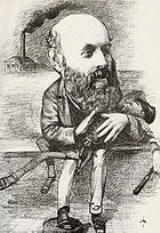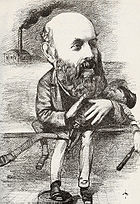
William Walls
Encyclopedia

Scottish people
The Scottish people , or Scots, are a nation and ethnic group native to Scotland. Historically they emerged from an amalgamation of the Picts and Gaels, incorporating neighbouring Britons to the south as well as invading Germanic peoples such as the Anglo-Saxons and the Norse.In modern use,...
lawyer
Lawyer
A lawyer, according to Black's Law Dictionary, is "a person learned in the law; as an attorney, counsel or solicitor; a person who is practicing law." Law is the system of rules of conduct established by the sovereign government of a society to correct wrongs, maintain the stability of political...
, industrialist and Dean of Guild
Dean of Guild
A Dean of Guild, under Scots law, was a burgh magistrate who, in later years, had the care of buildings.Originally, the post was held by the head of the Guild brethren of Scottish towns, and dates back to the 12th century. Later, the phrase Dean of Guild also described the courts set up in the 14th...
of Glasgow.
The son of John Walls and Elizabeth (née Flett), he was born in Kirkwall, Orkney, and trained as a lawyer in Edinburgh before founding whale oil merchants and refiners William Walls & Co in 1847, in Glasgow. Walls served as a town councilor of Glasgow from 1868–1886, latterly acting as Treasurer. He is credited as helping to secure the post of Town Clerk for his fellow Orcadian Sir James David Marwick
James David Marwick
Sir James David Marwick was a Scottish lawyer, historian and town clerk. He served as Town Clerk of Glasgow for thirty-one years, during which time the entire city was transformed...
who was to largely influence and direct the lines of Glasgow's development in the second half of the 19th century. Walls was instrumental in developing Loch Katrine
Loch Katrine
Loch Katrine is a freshwater loch in the district of Stirling, Scotland. It is roughly 8 miles long by 2/3 of a mile wide and runs the length of Strath Gartney...
as a reservoir to provide clean water for Glasgow's burgeoning population and, among other awards, was presented with a medal by the Corporation and citizens in recognition of his services in 1859. He was appointed Dean of Guild
Dean of Guild
A Dean of Guild, under Scots law, was a burgh magistrate who, in later years, had the care of buildings.Originally, the post was held by the head of the Guild brethren of Scottish towns, and dates back to the 12th century. Later, the phrase Dean of Guild also described the courts set up in the 14th...
of Glasgow in 1887 and continued in this position until his retirement in 1889.
His company, William Walls & Co, played an instrumental role in the substantial growth of Glasgow as one of Britain's leading industrial cities and by the 1860s was a major local employer. The Maryhill
Maryhill
Maryhill is an area of the City of Glasgow in Scotland. Maryhill is a former burgh. The population of Maryhill is about 52,000. Maryhill stretches over along Maryhill Road...
works grew exponentially and this sometimes brought Walls into conflict with early anti-pollution legislation. In 1874 he was charged with contravening the smoke section of the Glasgow Police Act, 1862, but the case was later dismissed. A caricature in the The Bailie portrays Walls comforting a policeman seemingly overcome by the effects of smoke-inhalation, an image which is also strongly redolent of his power and influence as a leading industrialist and burgh councilor.
Walls married Sarah Cole, daughter of Thomas Cole, in 1847, and was succeeded as senior partner of William Walls & Co in 1889 by his eldest son William Andrew Walls. Walls Street in Glasgow is named after him.
Sources
- Memoir of Sir James David Marwick, John Gray McKendrick, 1909.
- The Lord Provosts of Glasgow from 1833 to 1902, John Tweed, 1902.
- Walls family papers (unpublished material)
- Glasgow City Archives, Dean of Guild Court

